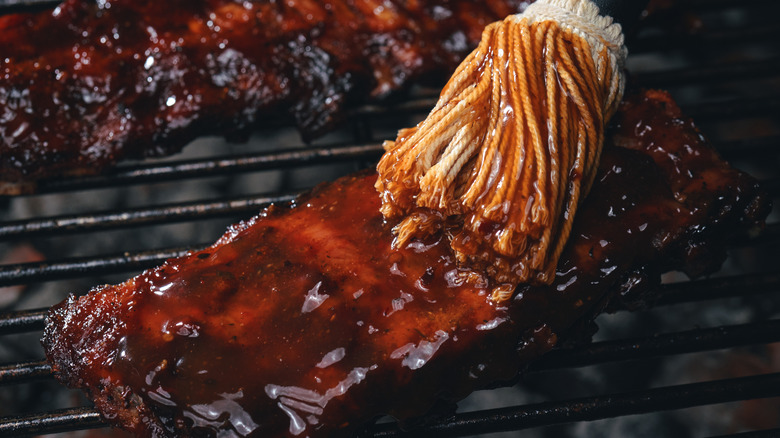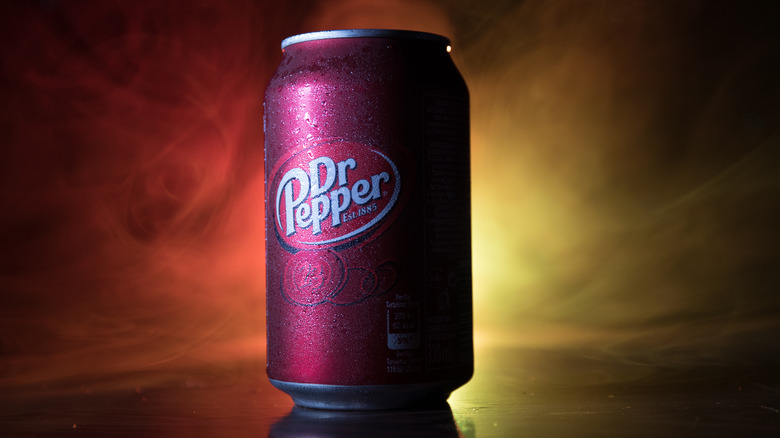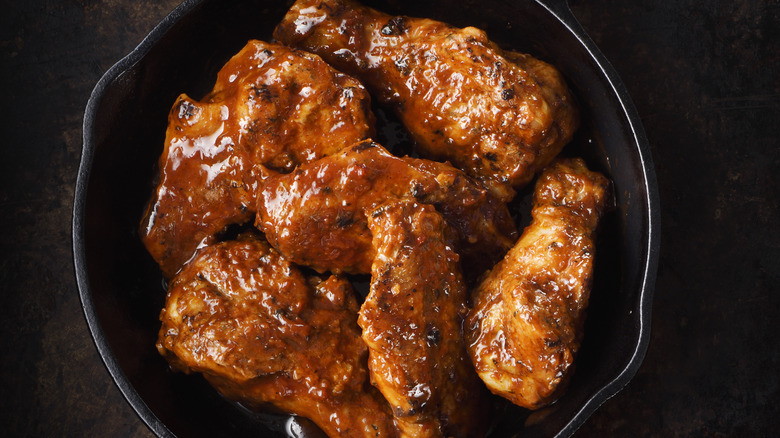Why Dr Pepper Is A Prize Ingredient For Some Barbecue Sauces
Dr Pepper has a deliciously complex flavor profile that contains sweet notes of cherry and vanilla rounded out with a spiced, peppery finish. It's a drink that evokes nostalgia, from its humble beginnings in a drugstore in Texas to its iconic slogans throughout the 1900s. Maybe the soda's staying power has something to do with its many different applications, which prove just how versatile it is. Incorporate a can into your barbecue sauce, and you may be charmed by this revelation.
Barbecue sauce recipes vary geographically, from thin to thick, and from smoky to intensely spicy. The ingredients are flexible, but the usual flavor profile includes at least one ingredient that adds sticky sweetness. In this case, Dr Pepper fulfills this role. Dr Pepper is exceptional not only for its sugar content but also for its spiced flavor that blends wonderfully into a barbecue sauce's tangy allure.
If you're not a fan of Dr Pepper, don't shy away from this idea just yet, as the soda's flavor is in no way the dominating element in this sauce; instead, it's a nuanced bystander. Moreover, once Dr Pepper has been reduced with other barbecue sauce ingredients, it adds a body to the sauce that's just too good to pass up.
Pop open a can
So, in terms of flavor, why is Dr Pepper such a welcome addition? Barbecue sauce usually features a spicy depth on both the heat and aromatic spectrums, which can be fantastically elevated with the peppery undertones of Dr Pepper — whether you're using mild chili powder, warm brown mustard, tangy garlic, hot cayenne pepper, or liquid smoke.
Barbecue sauce also typically includes tomatoes as a base, whether in ketchup or purée form. Either one is complemented by the sweet allure of Dr Pepper. Suppose you're apprehensive that the barbecue sauce will be altogether too sweet. In that case, this can always be balanced with the punchy umami behind Worcestershire sauce or toned down by apple cider vinegar's crisp acidity.
One note of caution when preparing this sauce is that the can of Dr Pepper should be the classic flavor (containing high-fructose corn syrup) or specially labeled "made with sugar," which means it uses pure cane sugar. To capture the authentic barbecue glaze stickiness, sugar is paramount.
Complementing the soda
Incorporating soda into a grilling session is not a new occurrence, as it's common to add cola to barbecue sauce. However, cola doesn't possess the same plethora of flavor components found in Dr Pepper. To be exact, the signature blend of Dr Pepper possesses 23 flavors, and although a precise list of these has not been shared nor confirmed by the company, there's always room for speculation. Instead of creating a barbecue sauce in which you mask the taste of Dr Pepper, there are ways to underline and celebrate its unique flavor.
If you're looking to explore the fruity flavors, such as blackberry, raspberry, and plum (which are rumored to be inside a Dr Pepper can), you may consider adding fruity jam or marmalade. Apricot jam would add a tart zing to the sauce, which would pair nicely with chicken wings or work as a honey glaze. Another rumored component in Dr Pepper is vanilla, so why not lean into this and add a few drops of vanilla extract to the sauce? Vanilla extract works exceptionally well in marinades, particularly with juicy meats like pork.
Dr Pepper is a prize ingredient for barbecue sauce because it introduces a sweetened but spiced flavor profile and acts as a sticky thickener. Stop regarding this can as only a beverage when it could be so much more.


